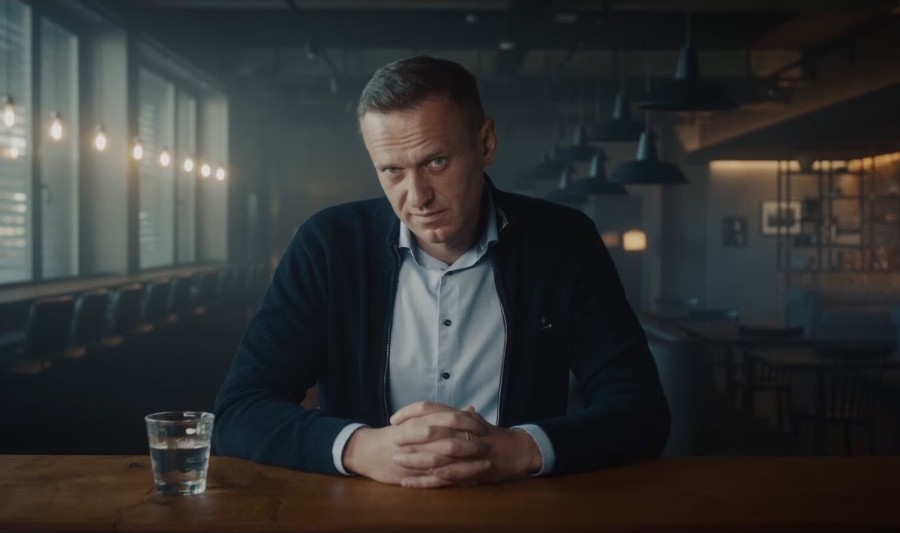Review: ‘Navalny’ is a profound portrait of the Russian activist
Nominated for an Oscar and now streaming on HBO Max, “Navalny” portrays a man who became the face of a movement.
March 3, 2023
Russia’s invasion of Ukraine has reaffirmed the horrors of President Vladimir Putin’s authoritarian regime to the world. With strict censorship rules and aggressive law enforcement, Russian citizens have spent years struggling to speak out against their government. One name that has grown to be a symbol of hope against this corrupt government is 46-year-old Alexei Navalny. A new documentary examining the most dramatic chapter of his life, “Navalny,” creates a compelling argument for revolution.
“If you are killed, if this does happen, what message do you leave behind to the Russian people?” director Daniel Roher asks Navalny in the opening shot. The activist, a straightforward yet charismatic man, responds, “Oh, come on, Daniel. No. No way. It’s like you’re making a movie for the case of my death.”
This brief exchange immediately lets the viewer know what’s at stake for Navalny, as he adds, “Let’s make a thriller out of this movie. And then, if I am killed, you can make a boring movie about memories.”
The film’s namesake is a prominent leader of the Russian opposition movement who first got into activism as a young attorney. After accessing confidential business information as a shareholder in several Russian companies, he disclosed corrupt practices by the Kremlin. Navalny founded the Anti-Corruption Foundation in 2011 and started his now-popular YouTube channel in 2013. He has led multiple opposition protests and unsuccessfully ran for both mayor of Moscow and Russian president. Since becoming an opposition activist, Navalny has been jailed more than 10 times, and is now so hated by the Kremlin that Putin refuses to say his name in public.
But “Navalny” is not a biographical tale of the titular man’s career. Instead, Roher focuses on a single event in Navalny’s life: when he was poisoned by the Kremlin in August 2020.
The film follows Navalny after he falls severely ill and collapses on a flight from Siberia to Moscow, causing the flight to be diverted. Navalny was taken to a hospital run by the Kremlin, where little about his condition was reported. When the Kremlin would not even allow Navalny’s wife Yulia Navalnaya or their personal doctor to visit him, as depicted in the film, people around the world demanded his release. After two days of protest, the Kremlin allowed him to be flown to Berlin.
Miraculously, Navalny survived. Doctors in Berlin discovered he was poisoned with the Novichok nerve agent, a deadly substance developed by the Soviet government. Since the Kremlin denies all claims that it was involved, it seems unlikely the truth will ever be uncovered. In the film, however, investigative journalist Christo Grozev, who is described as “a nice Bulgarian nerd with a laptop,” finds information that could help uncover who poisoned Navalny. When the two men, along with Maria Pevchikh, the head of the Anti-Corruption Foundation’s investigative unit, team up to analyze Grozev’s findings, the film goes from a standard tell-the-facts documentary to an espionage thriller. The intense atmosphere helps build up to a climax so unbelievable that even Hollywood could never come up with it.
Despite the high stakes, “Navalny” stands out for how it humanizes its subject. Roher avoids idealizing Navalny by including his past involvement in nationalist causes and financial mishandlings in the film. While Navalny’s actions over the years are commendable, they have also caused great pain in his and his family’s lives, described in heartbreaking interviews throughout the documentary.
Roher’s film proves Navalny is a determined man with the presence of a movie star. His humble demeanor, alongside his political zeal, make him a beacon of hope for activists fighting against oppressive regimes around the world. “You’re not allowed to give up,” Navalny says at one point in his documentary. “If they decide to kill me, it means that we are incredibly strong … We don’t realize how strong we actually are.”
Contact Madeline Kane at [email protected].
























































































































































